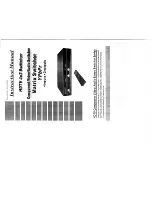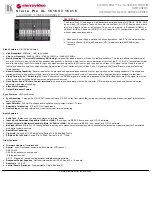
1
IP routing basics
Overview
IP routing directs the forwarding of IP packets on routers based on a routing table. This book focuses on
unicast routing protocols.
The term "router" in this chapter refers to both routers and Layer 3 switches.
The types of interfaces that appear in any figures other than the network diagrams for configuration
examples are for illustration only. Some of them might be unavailable on your switch.
Routing table
A router maintains at least two routing tables: one global routing table and one forwarding information
base (FIB). The FIB table contains only the optimal routes, and the global routing table contains all routes.
The router uses the FIB table to forward packets. For more information about the FIB table, see
Layer 3—IP
Services Configuration Guide
.
Routes can be classified by different criteria, as shown in
Table 1
.
Table 1
Categories of routes
Criterion Categories
Destination
•
Network route
—Destination is a network. The subnet mask is less than 32 bits.
•
Host route
—Destination is a host. The subnet mask is 32 bits.
Whether the
destination is directly
connected
•
Direct route
—Destination is directly connected.
•
Indirect route
—Destination is indirectly connected.
Origin
•
Direct route
—A direct route is discovered by the data link protocol on an interface,
and is also called an "interface route."
•
Static route
—
A static route is manually configured by an administrator.
•
Dynamic route
—
A dynamic route is dynamically discovered by a routing protocol.
Static routes are easy to configure and require less system resources. They work well in small and stable
networks. In networks where topology changes may occur frequently, using a dynamic routing protocol
is better.
To display brief information about a routing table, use the
display ip routing-table
command:
<Sysname> display ip routing-table
Routing Tables: Public
Destinations : 7 Routes : 7
Destination/Mask Proto Pre Cost NextHop Interface
1.1.1.0/24 Direct 0 0 1.1.1.1 Vlan11
…
































